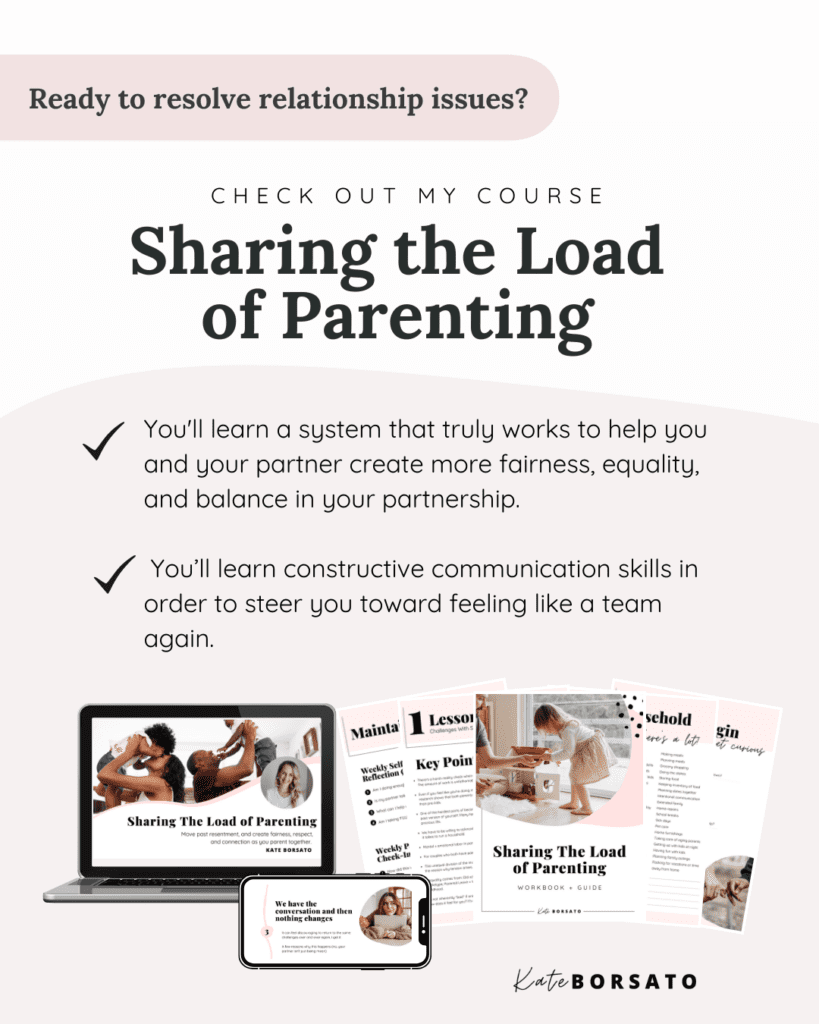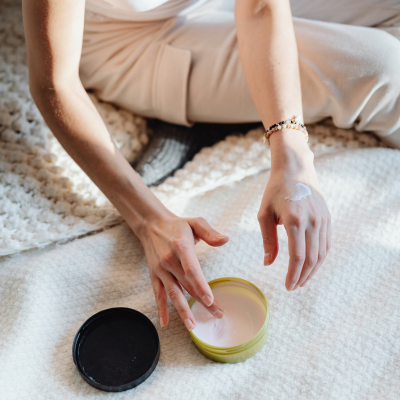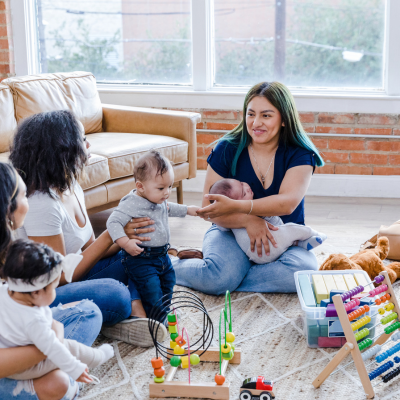If you feel like you hate your partner these days, these five reasons might explain why…
Ok I’m going to be the person who just says it honestly. Relationships can really tank after having a baby.
This is one of those things that’s common but feels awful. It can also seem out of nowhere. One day you’re in love with the person you chose as a life partner and a mere few months and one baby later, everything they do irritates you!
And most likely, nobody told you, right?
We prepare for motherhood with birth classes, baby showers, prepping the baby rooms, and buying all the essentials… but somehow many of the most practical things get lost in the excitement. Like navigating your relationship after your newborn baby arrives.

There’s an entire scale of what relationship problems after a new baby feel like. This describes anything from feeling like you hate your partner, wanting to snap at them, feeling disconnected, not wanting any level of sex or intimacy with them, or just carrying around a grudge for reasons you can’t quite name.
Even though this is common, it can feel horrible. No, you’re not doomed. You’re not headed for a breakup or divorce. This is just a strange and really tough period of adjustment.
But why do these relationship problems surface after having a new baby? Here are five of the most common reasons.
#1 Your whole world has changed
From your sleep routine (or lack thereof), to your daily priorities, to your body, to the things you spend your time on, literally everything has changed. Overnight.
Before you may have spent your days building your career, working on personal projects, having coffee with friends or hiking outdoors. Now, you’re waking several times in the night, feeding constantly, soothing baby cries, and you don’t even feel at home in your own body. It’s a lot.
When you look at your partner’s life, it hasn’t even undergone a fraction of those changes. No matter how much they support where they can, it’s still a much bigger adjustment for you. That pisses you off!
#2 It feels like everything is on you
While there are certain things that will naturally fall more to you (like breastfeeding, editing your diet in order to ensure a healthy milk supply, physically adjusting after birth), it shouldn’t all be on you.
Societal expectations placed on women in general and mothers in particular can be hard to break from. You and your partner may not subscribe to traditional gender norms but even still, they’re so ingrained that you might not even realize the ways you’re automatically taking on more.
I encourage you to sit down and ask yourselves: who is taking on what responsibilities, and does this feel fair? If things feel unfair, resentment will build over time. That’s pretty much like the relationship version of allowing a roof leak to go unaddressed: it builds over time and the problem gets worse and worse.
〰️ I’ve created a self-paced online course that directly addresses the common (but really detrimental) issue of having an unequal division of responsibilities, called Sharing the Load Of Parenting. This would be a great resource to watch with your partner so you can get on the same page and nip that resentment in the bud asap.
#3 You’re touched out
Ok, your body has just gone through the process of getting pregnant (maybe that was easy, or maybe that involved fertility treatments, lifestyle changes, miscarriage, etc.), birth, the recovery from both of those things, and now pumping/feeding (if you’ve chosen to do so).
You also have a baby and possibly other children constantly in need of physical affection and care. You are… touched out! In other words, you may be feeling exhausted by the physical aspect of motherhood and the amount that your body is needed during this stage.
When it comes to sex, touch, or any type of physical intimacy with your partner, you may just not have the capacity. That’s both understandable and common but some couples may find it creates a distance that didn’t used to exist.
Just know that this is very common, and doesn’t mean anything bad about your relationship. It’s okay to let your partner know how you’re feeling too, and request a little bit more physical space when you need it. Some moms find that having some time, say after the kids go to bed, where they have a break from being touched can help them feel more open to physical intimacy later on.
One of my favourite resources for any kind of intimacy challenge is Vanessa and Xander Marin, their Instagram is great and you’ll find tons of tangible strategies to help with this.
We also know that for many moms, their desire for physical intimacy can tank when they don’t feel supported, or when they feel like the load of parenthood is unfairly divided. So, figuring out ways to share the load is also going to help in this area too.
#4 You feel unappreciated and unseen
From my years as a therapist, as well as witnessing not only myself but women and couples around me and in my community, I can confidently say that most moms feel unappreciated, unseen, and even taken for granted at some point.
If you spend time online and in mom communities, you’ll likely have heard about “the invisible load of motherhood.” This refers to the mental and emotional labour that mothers are more likely to take on. That’s the planning, thinking, worrying, logistics managing, and caring that you do for your family. Because all this deciphering, anticipating and problem solving exists in your own private thoughts, it’s not outwardly visible and therefore largely goes unseen.
Just pause to think about your week so far, and all the things you’ve managed. How much is happening internally, where an outsider might not even notice? For moms who are at home with kids, they sometimes get to the end of the day knowing they’ve worked hard all day but yet wracking their brains to pinpoint what they actually accomplished. What’s worse is the (unfair) question: “What did you do all day?” But here’s the thing: childcare is a lot. The meal planning, anticipating needs before they happen, managing big emotions (toddler meltdown, anyone?), managing what feels like a thousand logistics each day, and just generally always being one step ahead… it’s a lot.
Parents can also go through phases of just getting by. They stop expressing appreciation and gratitude towards one another or take one another’s contributions for granted. When we feel like our efforts are unseen and unappreciated, it can leave us feeling very alone in our experience. And understandably resentful towards our partner.
#5 You’re completely drained and exhausted
This is a pretty obvious reason why you might be dealing with relationship problems after having a baby but one worth noting. You’re straight up exhausted!
If you’re running on fumes, tired beyond belief and both mentally and physically drained, tensions can run high. Your nervous system is also totally out of whack! A tired brain can really compromise our days because you don’t have the same cognitive ability to problem solve and communicate.
When tired, smaller things can also feel big. Instances that may not upset you under normal circumstances can suddenly cause a major fight. Instead of thinking that you’re doomed or that you’re headed for divorce, try to reason with yourself here. Imagine the stress you could let go of if you were able to reframe this kind of tension and understand that the months after a baby are just plain hard! For you and your partner. It won’t always feel this way.
_____________
Not all stages in life are created equally. Although it might be unsettling to confront certain changes that can feel uncomfortable or hard to adjust to, your experience in motherhood will be easier emotionally if you allow some flexibility.
Can you allow for some chapters to just bring new challenges without catastrophizing or feeling like you have to erase the issues asap? (I.e. “I want a divorce!”) Most couples (67% in fact) say their relationship satisfaction tanks for 3 years post kids, so can you hang in there and work on what you can control in the meantime? Can you accept that certain areas of life won’t look as they did in the past while remaining curious about what’s waiting for you just around the corner, or what small changes you could make today that would help you feel a bit more connected?
Want to learn more from me about this topic?
This is of course a tricky one to manage and it can feel easier said than done. Most relationships go through some kind of turbulence when a new baby arrives and there can be a lot of guilt, shame, fear, and discouragement when that happens.
For that reason, I created my course, How To Share The Load Of Parenting. So many couples struggle and yet NO ONE talks about it! If you’ve related to the themes touched on in this blog post, this course is like your guide to iron out the little bumps and snags that are occurring in your relationship before they fester into a major issue. In this self-paced course you will learn to identify issues and communicate them more effectively as well as parent in a way that’s fair and aligned to your values and lifestyle.









Comments +